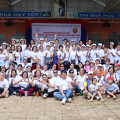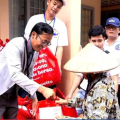This article provides comprehensive information on the importance of supporting the elderly, common forms of assistance, relevant organizations and programs, and a practical call to action to join hands in caring for the senior community.
Supporting the Elderly: Compassion, Care, and Community
Older adults are an essential part of society, and supporting them is not only a moral responsibility but also brings significant benefits to the community. This article delves into the importance of elder support, common forms of assistance, related organizations and programs, and a call to action to join hands in building a more compassionate society.
The Importance of Supporting the Elderly
An Aging Population and Growing Needs
The global population is aging rapidly, and Vietnam is no exception. The increasing number of elderly individuals means a rising demand for support in health care, finances, emotional well-being, and daily living. Many older adults struggle to care for themselves and require assistance to maintain a dignified quality of life.
The Social Benefits of Elder Support
Helping older adults benefits not only the individuals themselves but also contributes to sustainable societal development. When seniors are well cared for, they can continue to share their experience, wisdom, and skills with the community. Moreover, effective support can reduce the burden on healthcare and social welfare systems.
Key Areas Where Support Is Needed
Elderly individuals require support in various aspects of life, including:
-
Health and medical care: Access to healthcare, rehabilitation, and home care services.
-
Financial and legal support: Assistance with pensions, insurance, and legal consultation.
-
Emotional and social support: Participation in cultural, recreational, and social activities.
-
Daily living support: Help with meals, personal hygiene, mobility, and household chores.
Common Forms of Elder Support
Health and Medical Assistance
One of the most critical forms of support includes access to priority medical services, home healthcare, nutritional guidance, and mental health support. Rehabilitation programs also play a key role in helping seniors maintain independence and mobility.
Financial and Legal Support
Many older adults face financial challenges due to retirement or lack of income. Providing subsidies, covering living expenses, and offering legal advice ensures a more stable life. Social and health insurance programs also help protect seniors from financial hardship.
Emotional and Social Support
Loneliness and social isolation can severely affect seniors’ mental health. Encouraging participation in cultural events, sports, clubs, or volunteer work helps them stay active, connected, and fulfilled. Emotional support is just as vital as physical care.
Daily Living Support
As people age, they often face challenges in self-care. Services like in-home caregiving, assistance with meals, hygiene, mobility, and housework help older adults live independently and comfortably.
Organizations and Programs Supporting the Elderly
Government Agencies
The government plays a key role through policies related to social welfare, healthcare, and financial support. Public agencies also monitor elderly care facilities to ensure service quality and safety.
Non-Governmental Organizations (NGOs)
Many NGOs work in the field of elderly support, offering caregiving services, counseling, and community outreach. These organizations often focus on vulnerable groups such as the disabled, isolated, or low-income seniors.
Community-Based Programs
Community programs are vital in connecting older adults with society. Volunteer activities, senior clubs, and lifelong learning classes help keep them engaged, informed, and socially active.
A Call to Action: Join Hands to Support the Elderly
Raise Awareness
We need to increase public awareness of the importance of supporting the elderly. Share information, tell inspiring stories, and encourage others to show care and compassion for the older adults around them.
Join Volunteer Activities
There are many ways to get involved—visiting, talking with seniors, helping with household tasks, or participating in health programs. Every act of kindness, no matter how small, brings joy and meaning to their lives.
Donate to Support Programs
If you are financially able, consider donating to organizations and programs that support the elderly. Your contributions provide crucial resources for care services, counseling, and community initiatives.
Supporting the elderly is a shared responsibility. Let’s work together to create a society that values, respects, and lovingly cares for its senior citizens.







Share comments